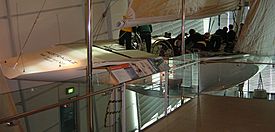Australia II facts for kids
 |
|
| Yacht club | |
|---|---|
| Nation | |
| Class | 12-metre |
| Sail no | KA–6 |
| Designer(s) | Ben Lexcen |
| Builder | Steve Ward |
| Launched | 1982 |
| Owner(s) | Alan Bond Australian Government c.1985 |
| Racing career | |
| Skippers | John Bertrand |
| Notable victories | 1983 Louis Vuitton Cup 1983 America's Cup |
| America's Cup | 1983 |
| Specifications | |
| Displacement | 21.8 tons |
| Length | 19.21 metres (63.0 ft) (LOA) 13.10 metres (43.0 ft) (LWL) |
| Beam | 3.64 metres (11.9 ft) |
| Draft | 2.72 metres (8 ft 11 in) |
| Sail area | 175 square metres (1,880 sq ft) |
Australia II (KA 6) is a famous Australian yacht that won the 1983 America's Cup. This was a huge moment because it was the first time in 132 years that a team had beaten the New York Yacht Club in this competition! The yacht was launched in 1982 and sailed for the Royal Perth Yacht Club. It was led by its skipper, John Bertrand.
Contents
Design of Australia II
Australia II was designed by Ben Lexcen. It was built by Steve Ward and owned by Alan Bond. The yacht had a special design that made it very fast and easy to steer.
The Winged Keel
One of the most important parts of Australia IIs design was its unique keel. A keel is like a fin on the bottom of a boat that helps it stay stable and move forward. Australia IIs keel had special "wings" on it. This "winged keel" helped the boat turn faster and stay more stable in the water.
When the winged keel was first seen, some people, especially the New York Yacht Club, wondered if it was allowed by the rules. But after some discussion, it was decided that the design was perfectly legal.
Australia II also had other cool features. These included new types of sails and a lightweight carbon fiber boom, which is a pole that helps hold the bottom of the sail.
Who Designed the Keel?
Years later, some people claimed that the winged keel was actually designed by a group of Dutch engineers. However, this idea was strongly denied by the Australian team, including skipper John Bertrand. It was confirmed that Ben Lexcen was the true designer. He had even experimented with similar ideas on other boats before.
Ben Lexcen joked about the design, saying he owed the secret to a "Greek guy who helped me out... He's been dead for 2000 years. Bloody Archimedes!"
Competitions and Victory
Australia II competed in two major races before winning the America's Cup.
Louis Vuitton Cup
First, Australia II raced in the 1983 Louis Vuitton Cup. This competition decides which team gets to challenge the current America's Cup champion. Australia II did very well, winning against other strong teams like Azzurra and Victory '83. This win meant they earned the right to challenge for the America's Cup.
America's Cup
In September 1983, Australia II (with sail number KA6) challenged the New York Yacht Club for the America's Cup. The New York Yacht Club had held the Cup since 1851, which was the longest winning streak in sports history!
Australia II, led by John Bertrand, raced against an American yacht called Liberty, skippered by Dennis Conner. The races took place off the coast of Newport, Rhode Island. It was a very close competition! Australia II had to come from behind to win 4 races to 3.
The victory on September 26, 1983, was a huge moment for Australia. It was celebrated all over the country. The team even won the "Athlete of the Year" award from the American Broadcasting Company (ABC) Wide World of Sports for their amazing achievement.
The crew of Australia II included John Bertrand (skipper), Will Baillieu, Colin Beashel, Rob Brown, Peter Costello, Damian Fewster, James Hardy (alternate helm), Ken Judge, Skip Lissiman, John Longley, Scott McAllister, Brian Richardson, Phil Smidmore, Grant Simmer, and Hugh Treharne. Many of them were very experienced sailors, including some who had competed in the Olympics.
Retirement and Display
In the mid-1980s, Australia II was sold to the Australian government. In 1991, it was put on display at the Australian National Maritime Museum in Sydney.
Later, in 2000, Australia II was moved to the Western Australian Maritime Museum in Fremantle. In 2001, for the 150th anniversary of the America's Cup, the yacht was taken out of the museum and sailed again with its original crew for some special races. After that, Australia II returned to the Western Australian Maritime Museum, where you can see it on permanent display today.
In 2017, the team of Australia II was honored by being included in the first group of people inducted into the Australian Sailing Hall of Fame.
Images for kids
See also
 In Spanish: Australia II para niños
In Spanish: Australia II para niños
 | Jessica Watkins |
 | Robert Henry Lawrence Jr. |
 | Mae Jemison |
 | Sian Proctor |
 | Guion Bluford |


